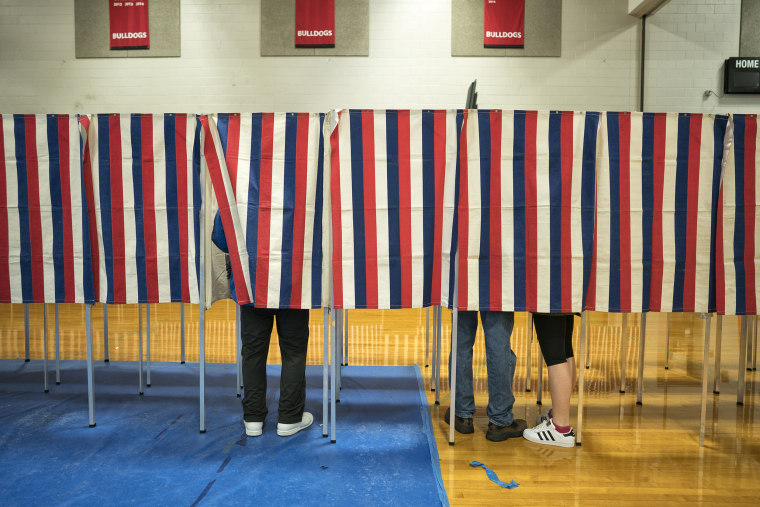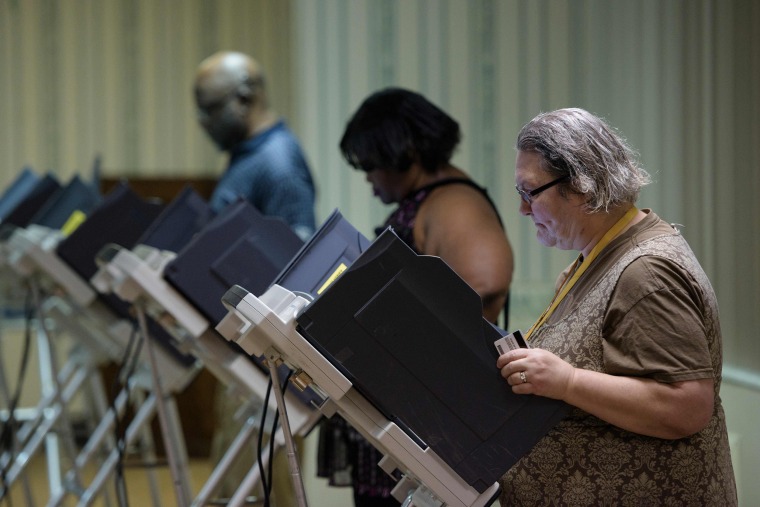Tuesday is National Voter Registration Day, when a network of thousands of voting rights and civic engagement groups will aim to add tens of thousands of Americans to the rolls. But despite the day’s non-partisan message, it comes at a time when voter registration has emerged as a major political and legal flash-point.
Several red states have run into legal trouble for restrictive policies that make it harder to get or stay registered to vote, while other states, mostly blue, are dramatically expanding access.
Coming off a well-received debate performance, Hillary Clinton on Tuesday urged supporters in Raleigh, North Carolina—where absentee voting has already begun—to register.
Related: And So It Begins: Absentee Voting Starts in North Carolina
"You may or may not know today is National Voter Registration Day," Clinton said. "I hope you all will, and hope you tell everybody that you know to do the same because we want to make sure people are registered."
The Clinton campaign sent high-profile surrogates including former President Bill Clinton, running-mate Tim Kaine and Vice President Joe Biden to press the same message in other battleground states. The campaign said it plans to hold 1,400 local voter registration events across the country Tuesday, part of a broader push to register or commit 3 million voters.
A spokesman for the Donald Trump campaign didn’t respond to a request for comment on what the campaign was doing to mark the day.
Meanwhile, fights over voter registration are playing out in the courts — and they could have a big impact this fall.

“It’s a shame that on a day when we should all be encouraging registration and making it easier, we have to fight these battles to get states to let people register to vote,” said Dale Ho, the director of the voting rights program at the American Civil Liberties Union, which is involved in several of the cases.
Citing the threat of non-citizen voting, Kansas, Arizona, Georgia and Alabama all have passed laws requiring registrants to show documentary proof of citizenship. Only Kansas — whose secretary of state, Republican Kris Kobach, is a staunch backer of restrictive voting rules — is enforcing its measure.
That’s put the Sunflower State in the cross-hairs of voting rights groups, who say the policy is keeping thousands of legitimate voters off the rolls in violation of federal voting law, while the number of non-citizen voters being stopped from illegally voting is negligible.
In a series of rulings that have punched gaping holes in the Kansas law, courts have largely agreed.
Related: Courts Rule Whether Thousands of Kansas Residents Can Vote
Earlier this month, a federal appeals court ruled against a move by the director of the Election Assistance Commission that had allowed Kansas and the other three states to require proof of citizenship on the federal voter registration form. In a separate but related case, a federal court ordered Kobach to restore to the rolls 18,000 applicants who registered through motor vehicles offices and didn’t provide proof of citizenship. And in yet another case arising out of the controversy, on Monday a state court said voter registration applicants in Kansas must be able to vote in the upcoming federal, state and local elections regardless of whether they showed proof of citizenship.
Perennial swing state Ohio has also been checked by the courts. On Friday, a federal appeals court ruled against the state’s procedure for removing inactive voters from the rolls. Under the system, Ohioans who haven’t voted in the last three national elections or any local or state elections in between can be removed if they don’t respond to a letter. An analysis found that voters in Democratic-leaning neighborhoods in the state’s three largest counties were far more likely to be removed than those in Republican-leaning ones.
And in Georgia, which could also be pivotal in the presidential election, voting rights groups earlier this month sued Secretary of State Brian Kemp, a Republican, over his strict rules for adding new voters to the rolls. They say more than 42,000 new applications — the vast majority from racial minorities — have languished over the last three-plus years because Kemp’s office requires a voter’s information on her application to exactly match that in existing state databases. As a result, they say, legitimate voters who don’t respond to a letter informing them of the problem are being kept off the rolls because of minor discrepancies like a missing accent, hyphen or middle initial.
Last week, Georgia agreed to take several steps to soften its policy. It remains in negotiation with voting rights advocates.
Related: Court Rejects Ohio's System for Removing Voters from Rolls
Still other Republican-controlled states have restricted registration in recent years. In 2011, Texas approved likely the strictest voter registration rules in the country. Non-Texans are barred from registering voters; anyone registering voters must undergo training through the county; no one can register voters in counties other than the county where they were appointed; and all voter registration applications must be personally delivered, rather than mailed. The same year, Florida passed a registration law so onerous that several voter registration groups were forced to pull out of the state until the measure was blocked by a court in 2012.
In both states, the Hispanic population is soaring, and Hispanics make up a disproportionate share of unregistered citizens.
Other states are moving in the opposite direction.
In the last year and a half, California, Oregon, Vermont, West Virginia and Connecticut have implemented Automatic Voter Registration (AVR), in which the state registers voters when they come into contact with a motor vehicles office, unless the voter chooses to opt out. All those states except West Virginia, whose legislature is led by Republicans, are entirely Democratic-controlled — reflecting the political reality that making registration and voting easier tends to help Democrats and hurt Republicans.
Related: Do Voter Purges Discriminate Against the Poor and Minorities?
Voting advocates think AVR has the potential to transform the electorate and lower a major hurdle to voting, especially for more marginalized Americans. Oregon, whose law went into effect January 1, says it’s on track to add 250,000 new voters to the rolls before the election, an increase of more than 10 percent. Lawmakers in 18 other states, and the U.S. Congress, have introduced AVR bills, and Clinton has backed the idea.
Meanwhile, more states, including red ones, are letting voters register online. Thirty-nine now offer online voter registration, or soon will.
Still, some election experts want to get rid of voter registration, at least as currently conceived, entirely. They note that the system was introduced in the 19th century in order to make it harder for certain groups—often recent immigrants, as well as southern blacks—to cast a ballot. And they say it has a similar effect today.
“I despise” National Voter Registration Day, Michael McDonald, a political science professor at the University of Florida and a leading expert on voting and registration, tweeted Tuesday, calling voter registration “among the most effective vote suppression tools in history.”
“So celebrate National Voter Registration Day by registering,” McDonald added, “but know that you have to do the chore because someone doesn’t want you to vote.”
